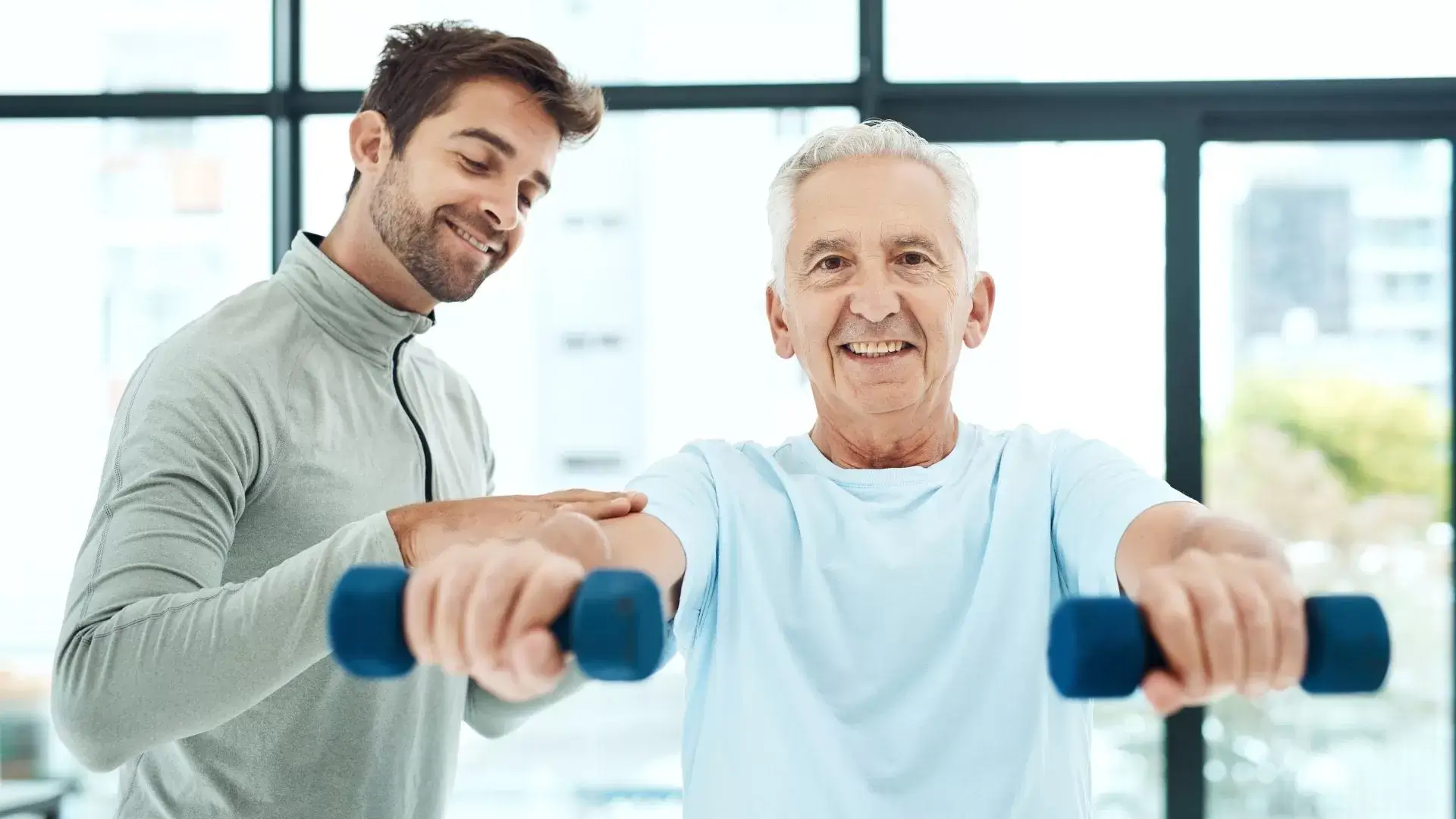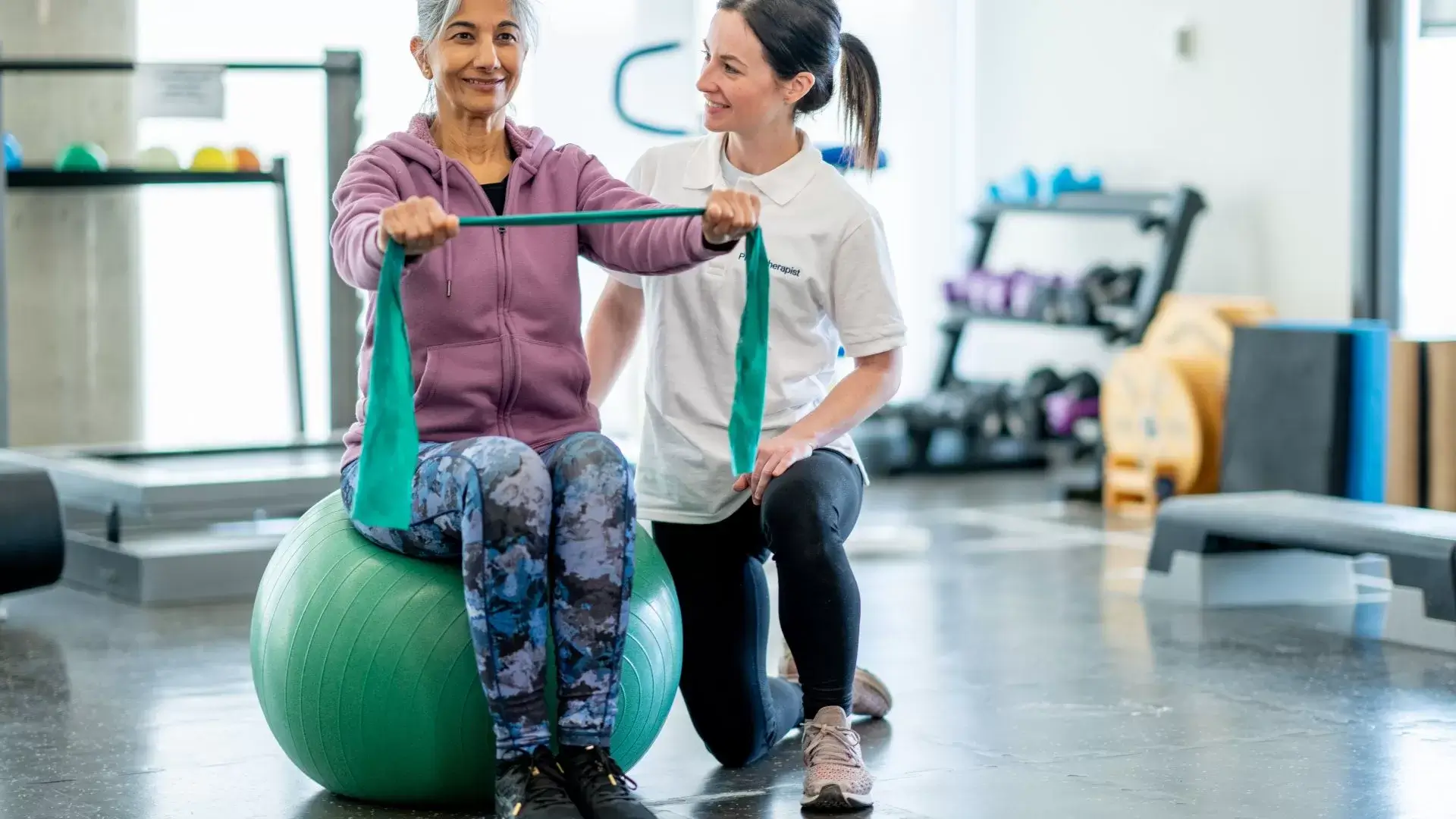We recognize that physiotherapy for geriatrics in Mississauga is essential for enhancing mobility and overall well-being among seniors. Our Expert Physiotherapist & Chiropractic Services in Mississauga provide tailored treatment plans that address mobility challenges, chronic pain, and conditions like arthritis and osteoporosis. With a focus on compassionate care, we aim to empower seniors while respecting their independence and dignity. Additionally, our wellness programs and balance training encourage social engagement and support daily activities. By creating safe home environments and promoting physical health, we believe we can greatly improve quality of life for our elderly population. Explore more about how we can support your journey.

At Mississauga Physio Chiro Clinic, we offer specialized physiotherapy and chiropractic services designed to address the unique needs of geriatric patients, ensuring they receive compassionate and effective care for improved mobility and overall well-being. Our focus on geriatrics allows us to tailor our approach specifically for elderly care, fostering an environment conducive to seniors’ health.
We understand that many seniors face mobility issues that can impact their daily lives. Through targeted geriatric rehabilitation programs, we help our patients regain strength and flexibility, promoting healthy aging. Our physiotherapy and chiropractic services include senior exercise routines that enhance balance and coordination, essential components in fall prevention.
Additionally, we recognize that chronic pain management is a significant concern for many elderly individuals. Our evidence-based strategies not only alleviate discomfort but also empower our patients to actively participate in their recovery. By combining our expertise in physiotherapy and chiropractic care, we aim to create personalized treatment plans that address each patient’s unique challenges and goals.
Together, we are committed to supporting our geriatric patients in achieving ideal health outcomes and enhancing their quality of life.
Aging brings about a myriad of changes that can greatly impact our physical health and mobility, often leading to decreased strength, flexibility, and balance. The aging process can result in chronic conditions like arthritis and osteoporosis, which can further limit our ability to stay active. In geriatric care, it’s essential to recognize these changes early, as they can lead to frailty and increased fall risk.
We may find that our endurance diminishes and our joints become stiffer, affecting our daily activities. To counter these challenges, incorporating mobility aids can enhance our independence and safety. Regular fall risk assessments help identify potential hazards, allowing us to create a safer living environment.
Engaging in physical therapy for the elderly can greatly improve our overall well-being. Tailored exercises not only promote senior fitness but also help manage symptoms of chronic conditions. By focusing on strength training, balance exercises, and flexibility routines, we can maintain mobility and improve our quality of life. Together, we can embrace the aging journey while prioritizing our physical health and mobility through proactive measures and compassionate care.
Recognizing the impact of chronic health conditions on mobility and quality of life, physiotherapy offers targeted strategies to help manage these issues effectively in older adults. We acknowledge that the aging population often faces challenges such as joint health problems and cognitive decline. Our approach incorporates balance training and tailored exercises that not only enhance mobility but also promote overall wellness.
Working closely with geriatricians, we assess each individual’s needs, helping to develop personalized treatment plans. These plans often include medication management strategies to minimize side effects that can affect physical activity. Additionally, we encourage participation in elderly wellness programs that foster social interaction and mental engagement.
Regular physiotherapy plays an indispensable role in enhancing bone strength and preventing osteoporosis among older adults by incorporating weight-bearing exercises and balance training tailored to individual needs. As we age, our bone health can decline, increasing the risk of osteoporosis, which is particularly concerning for the elderly. Through evidence-based strength training, we can markedly improve bone density and overall mobility.
In geriatric medicine, physiotherapy focuses on rehabilitation strategies that not only strengthen bones but also enhance balance and coordination. This is vital for fall prevention, a major concern for senior health. By engaging in specialized exercises, we can help our elderly clients develop the strength necessary to maintain their independence and reduce the risk of fractures.
Moreover, we recognize the unique challenges faced by older adults and approach each session with empathy and respect. We encourage a supportive environment where our clients feel comfortable and motivated to participate in their rehabilitation journey. By prioritizing bone health and implementing effective physiotherapy interventions, we can contribute to a higher quality of life for seniors, promoting longevity and well-being in the community.

To effectively manage joint health and provide arthritis relief for seniors, we must tailor physiotherapy interventions that address individual pain levels and mobility challenges. Our focus is on evidence-based arthritis treatment strategies, integrating exercise programs that promote flexibility and strength, thereby combating sarcopenia.
We recognize the importance of senior nutrition in supporting joint health, as a balanced diet can considerably contribute to overall well-being. By incorporating nutritional guidance into our sessions, we empower seniors to make informed choices that enhance their physical and emotional well-being in aging.
In addition to physiotherapy for geriatrics, we often collaborate with occupational therapy for the elderly to guarantee that daily activities can be performed comfortably and safely. Aging in place is a priority for many seniors, and our goal is to provide the necessary support through tailored home care approaches.
As we help seniors navigate retirement planning, we emphasize the importance of maintaining joint health to prolong independence and quality of life. By addressing these multifaceted aspects, we create a supportive environment that fosters both physical and emotional resilience in aging.
Addressing joint health and mobility challenges is vital not only for managing arthritis but also for preventing falls and enhancing balance in older adults. We understand that falls are a major concern, impacting not just physical health but also elderly mental health. Through targeted physiotherapy for geriatrics, we can develop personalized strategies to strengthen muscles and improve coordination, greatly reducing the risk of falls.
In our practice, we emphasize the importance of caregiver support, empowering families to create safe environments. Home modifications for seniors, such as removing tripping hazards and incorporating vision aids, play a key role in maintaining safety. We also recognize that neurodegenerative disorders and sleep disorders in the elderly can exacerbate balance issues. Therefore, our approach includes thorough assessments that address these factors.
Rehabilitation for stroke and neurological conditions in seniors requires a tailored approach that focuses on restoring function and enhancing quality of life through evidence-based physiotherapy interventions. We recognize that each individual faces unique challenges, including memory loss, hearing loss, and the effects of polypharmacy, which can complicate recovery.
Our physical therapy for elderly patients incorporates geriatric counseling to address both physical and emotional needs, recognizing that depression in the elderly can greatly impact recovery. By fostering an environment that promotes assisted living or supports a shift to independent living, we empower seniors to regain autonomy and improve their overall well-being.
We implement targeted exercises, mobility training, and strength-building techniques designed specifically for neurological conditions in seniors. Our goal is to enhance not only physical capabilities but also to improve confidence and social interaction, which are crucial for mental health. Through ongoing assessment and adjustment of rehabilitation strategies, we help seniors navigate the complexities of their conditions while fostering a supportive community. Together, we aim to make a meaningful difference in their rehabilitation journey, ensuring that seniors can lead fulfilling lives despite the challenges they face.
Supporting cognitive function and memory in seniors through physiotherapy involves a multifaceted approach that integrates physical activities with cognitive exercises tailored to individual needs. As we collaborate with elderly clients, we acknowledge the impact of age-related diseases, such as dementia, on their cognitive health. By combining physiotherapy with cognitive therapy, we can enhance memory and support overall brain function.
Engaging seniors in physical activities not only improves their mobility but also stimulates cognitive processes. For instance, exercises that require coordination can help mitigate the effects of social isolation, a common challenge faced by many older adults. Additionally, we take into account potential vision impairment, ensuring our activities are safe and accessible.
Our goal is to extend life expectancy while promoting a better quality of life. We recognize that maintaining cognitive function is essential for independence and well-being. As a result, we adopt an empathetic approach, encouraging seniors to participate actively in their rehabilitation journey. Together, we can create a supportive environment that nurtures both physical and cognitive health, ultimately improving the lives of our elderly clients.
Incontinence is a common issue among seniors, and through targeted physiotherapy approaches, we can help manage and reduce its impact on their daily lives. Our focus on urinary incontinence in the elderly often involves a multi-faceted rehabilitation strategy that prioritizes both physical and emotional well-being.
One effective method we employ is pelvic floor exercises, which strengthen the muscles responsible for bladder control. These exercises can notably enhance the quality of life for our clients by alleviating symptoms and boosting confidence. Additionally, we incorporate bladder training, which involves scheduled voiding to help retrain the bladder and reduce urgency.
We understand that mobility plays an essential role in managing incontinence. By improving overall physical function, we empower seniors to engage in activities they enjoy without fear of accidents. Our approach to geriatric care is rooted in empathy; we endeavor to create a safe space where seniors feel comfortable discussing their concerns.
Ultimately, our goal is to enhance our clients’ quality of life through tailored physiotherapy interventions that address incontinence, ensuring they can maintain independence and participate fully in their daily activities.
Addressing mobility challenges and muscle loss in seniors is essential for maintaining their independence and overall quality of life, and physiotherapy offers effective strategies to combat these issues. In geriatric care, we recognize that the elderly often face mobility challenges that can lead to increased risks of falls and decreased confidence in daily activities. Through specialized rehabilitation programs, we can target muscle loss and improve physical function.
Our tailored exercise programs focus on strength training, balance, and flexibility, which are key components of physical therapy for senior health. By engaging in these exercises, seniors can rebuild muscle mass, enhance coordination, and greatly reduce their risk of falls. Additionally, we employ evidence-based techniques that are not only safe but also effective in promoting overall well-being.
As we navigate the unique challenges of aging, it’s important to foster an environment of support and encouragement. By partnering with seniors in their rehabilitation journey, we can help them regain mobility and maintain their independence, ultimately enhancing their quality of life. Together, we can address the complexities of muscle loss and mobility challenges, ensuring a healthier, more active lifestyle for our elderly population.
As we focus on enhancing mobility and muscle strength in seniors, it’s equally important to explore effective pain relief strategies that can greatly improve their overall comfort and daily functioning. In our practice, we recognize that the elderly often experience chronic pain related to conditions such as hypertension, cardiovascular disease, and diabetes. Physiotherapy plays a key role in pain management and rehabilitation, utilizing tailored exercises and techniques to alleviate discomfort.
One effective approach involves gentle stretching and strengthening exercises designed to enhance mobility while minimizing pain. Additionally, we may incorporate modalities such as heat therapy, ultrasound, or electrical stimulation to provide immediate pain relief. For those needing palliative care, we emphasize a compassionate approach, focusing on the individual’s unique needs and preferences.
Education is also essential; we encourage seniors and their families to engage in self-management strategies, such as maintaining a healthy weight and staying active within their limits. Ultimately, by integrating these pain relief strategies into our physiotherapy sessions, we can greatly enhance the quality of life for our elderly clients, ensuring they remain active participants in their rehabilitation journey.
When seniors experience vision and hearing loss, it’s essential for us to adapt our physiotherapy approaches to assure they receive effective and safe care tailored to their unique needs. In physiotherapy for geriatrics, we recognize that both vision and hearing impairments can greatly impact rehabilitation outcomes. By incorporating adaptive techniques, we can facilitate better communication and understanding during therapy sessions.
For instance, we often utilize assistive devices, such as visual aids and hearing amplifiers, to enhance engagement. These tools are critical in making sure that our elderly clients can actively participate in their rehabilitation process. Additionally, integrating speech therapy for the elderly can help address communication challenges, fostering a more supportive therapeutic environment.
Moreover, we must consider the importance of respite care and long-term care options for seniors with these challenges. Providing a holistic approach that includes family education and involvement is essential in creating a thorough elderly care plan. By adapting our methods, we make certain that we meet the distinct needs of seniors experiencing vision and hearing loss, ultimately improving their quality of life and functional independence.

Creating a safe home environment is fundamental for enabling seniors to age in place with dignity and independence. By evaluating and modifying their living spaces, we can greatly reduce risks, allowing for greater autonomy and comfort. Simple changes like removing tripping hazards, installing grab bars, and guaranteeing proper lighting can make a world of difference in preventing falls.
Moreover, it’s essential to address aspects of well-being that may impact the elderly, such as vitamin D deficiency, which can affect mobility and strength. Regular physiotherapy for geriatrics can help enhance physical function, complementing the efforts made in creating a safe home environment.
We must also consider the emotional and psychological factors associated with aging in place. Awareness of elder abuse is crucial, as is fostering a supportive network to combat feelings of isolation that may arise. Financial planning for seniors, including advance directives and end-of-life care options like hospice care, should be discussed to confirm that all aspects of aging are addressed.
Physiotherapy plays an essential role in promoting mental well-being and fostering social connections among older adults, addressing both physical and psychological aspects of health. At our clinic located at 1834 Lakeshore Rd W unit 6C, Mississauga, ON L5J 1J7, we recognize that conditions like Alzheimer’s disease and Parkinson’s disease can greatly impact not only physical mobility but also emotional health.
Through tailored physiotherapy programs, we encourage participation in group activities that facilitate social interaction, helping to combat feelings of isolation often experienced by seniors. Additionally, we provide education on managing age-related issues such as cataracts, glaucoma, and macular degeneration, empowering our clients to maintain their independence and engage with others.
Our approach also includes the integration of hearing aids, ensuring that communication remains open and effective. By fostering an environment that prioritizes both physical rehabilitation and social engagement, we create a supportive community for our clients. If you have any questions or need assistance, feel free to contact us. Together, we can enhance mental well-being and build meaningful connections that contribute to a better quality of life for our seniors.
Seniors in Mississauga deserve expert physiotherapy care that’s not only tailored to their unique needs but also designed to enhance their overall health and well-being. We recognize the complexities that come with aging, including mobility challenges, chronic pain, and the need for rehabilitation after injuries. Our dedicated team of physiotherapists employs evidence-based practices to create individualized treatment plans that address these issues.
By conducting thorough assessments, we identify each senior’s specific goals and limitations, guaranteeing that our interventions are both effective and safe. Whether it’s strengthening exercises, balance training, or pain management techniques, our approach is empathetic and respectful, recognizing the importance of maintaining independence and dignity.
We also prioritize ongoing communication, involving both seniors and their families in the treatment process. This collaborative effort guarantees that we’re not just treating symptoms but also empowering seniors to lead healthier, more active lives. With our expert physiotherapy care, seniors in Mississauga can experience improved physical function, enhanced quality of life, and greater confidence in their daily activities. Together, we can help seniors thrive in their golden years.
Nestled in the heart of the Greater Toronto Area, Mississauga is a vibrant city known for its diverse communities, rich cultural offerings, and extensive recreational facilities. With a population exceeding 700,000, we represent a microcosm of global cultures, making it a welcoming place for all. This diversity fosters a supportive environment for our seniors, who can find community programs tailored to their needs.
The city boasts well-maintained parks, community centers, and sports facilities, promoting an active lifestyle. We recognize the importance of physical health, especially for our aging population, and endeavor to provide access to various health services, including physiotherapy. Local clinics and hospitals are equipped with the latest technologies and staffed by professionals dedicated to improving the quality of life for older adults.
In addition, Mississauga’s commitment to accessibility is evident in its infrastructure and transportation, ensuring that our seniors can navigate the city with ease. As we continue to grow and evolve, we remain focused on creating a supportive environment where every senior can flourish, enjoying the many resources and opportunities our city has to offer. Together, we can enhance the health and well-being of our cherished senior community.

When we’re seeking a geriatric physiotherapist, we should prioritize qualifications that reflect expertise in elderly care. Look for a licensed professional with specialized training in geriatric physiotherapy, ideally holding a Master’s or Doctorate in the field. Certifications in areas like fall prevention or mobility enhancement are also beneficial. It’s important they possess experience working with older adults, as well as a compassionate approach to guarantee our loved ones receive the best care possible.
Supporting seniors during physiotherapy sessions involves our active participation and encouragement. We can help by attending sessions, providing emotional support, and reinforcing the importance of exercises at home. It’s essential to communicate with the physiotherapist for tailored guidance and to understand the goals of the treatment. By fostering a positive and motivating environment, we can enhance their confidence and commitment, ultimately leading to better outcomes in their rehabilitation journey.
When considering exercises for seniors with limited mobility, we should focus on gentle yet effective movements. Activities like seated leg lifts, chair yoga, and resistance band exercises are excellent options. These exercises promote strength, flexibility, and balance, all while ensuring safety. It’s vital to tailor routines to individual abilities, allowing for gradual progression. By fostering a supportive environment, we can help seniors maintain their independence and overall well-being while enhancing their physical capabilities.
When considering how often seniors should attend physiotherapy sessions for ideal results, we recommend a frequency of one to three times a week, depending on individual needs and goals. Regular attendance helps maintain consistency, enhances strength, and improves mobility. It’s crucial to tailor the schedule based on each person’s progress and comfort level, ensuring that sessions remain beneficial without overwhelming them. We should always prioritize their well-being and adapt as necessary.
During a typical physiotherapy assessment for seniors, we can expect an extensive evaluation of mobility, strength, and overall physical condition. The therapist will ask about medical history and any specific concerns. We’ll likely undergo a series of tests to gauge our balance and flexibility. This process helps tailor a personalized treatment plan that addresses our unique needs, ensuring we feel supported and understood throughout our journey to improved health and mobility.
Reach out to us today to book an appointment or learn more about our services. Our friendly team is here to answer your questions and help you take the first step toward improved health and wellness.
(647) 372-1209

At our “Mississauga Physio Chiro Clinic”, we are dedicated to providing personalized care that addresses the root cause of your discomfort. With a team of experienced physiotherapists and chiropractors, we focus on restoring your mobility, relieving pain, and enhancing your overall well-being.